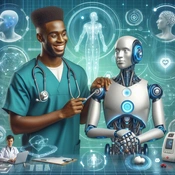In the ever-evolving landscape of healthcare, one technological advancement stands out as a game-changer: Artificial Intelligence (AI). From precision medicine to chatbots assisting medical practitioners, AI is reshaping the way we approach healthcare. In this comprehensive blog post, we'll delve into the world of AI in medicine, exploring its applications, challenges, and the future it promises. Join us on this journey as we uncover how AI is transforming healthcare for the better.
Imagine a world where doctors have access to a vast repository of medical knowledge, where diagnoses are made with unprecedented accuracy, and where treatments are tailored to each patient's unique needs. This is the promise of artificial intelligence (AI) in medicine.
In recent years, AI has made remarkable strides in various industries, and healthcare is no exception. From assisting in diagnosing diseases to predicting patient outcomes, AI has the potential to revolutionize the way we approach medical care. In this blog post, we will explore the applications of AI in medicine, highlighting its benefits and potential challenges.
The Rise of Artificial Intelligence in Medicine
AI-Assisted Diagnosis
One of the most exciting applications of AI in medicine is its ability to assist in diagnosing diseases. Traditionally, doctors rely on their expertise and knowledge to interpret symptoms and make a diagnosis. However, AI can augment this process by analyzing vast amounts of medical data and identifying patterns that may not be obvious to human doctors.
Take the example of skin cancer diagnosis. Skin cancer can be challenging to diagnose accurately, even for experienced dermatologists. However, researchers have developed AI algorithms that can analyze images of skin lesions and detect potential signs of cancer with remarkable accuracy. These algorithms can compare the lesion with a database of thousands of images, allowing for a more accurate and timely diagnosis.
Moreover, AI can also assist in diagnosing diseases by analyzing medical records, lab results, and other patient data. By considering a patient's complete medical history and comparing it with a vast pool of anonymized patient records, AI algorithms can identify patterns and detect potential diseases at an early stage. This early detection can significantly improve patient outcomes and potentially save lives.
Artificial Intelligence: A Paradigm Shift
The integration of artificial intelligence in medicine represents a paradigm shift in healthcare. Traditional one-size-fits-all approaches are making way for precision medicine, a field that leverages AI to customize diagnostics and treatments for individual patients.
Precision Medicine: Tailoring Healthcare
Precision medicine is at the forefront of AI's impact on healthcare. It involves customizing therapies based on diagnostic tests, genomic data, and an individual's unique physiological attributes. This tailored approach is made possible through AI chat systems, which assist medical practitioners in interpreting complex genetic data.
Explore the latest advancements in Artificial Intelligence in Precision Medicine with our dedicated journal. Immerse yourself in cutting-edge research articles, case studies, and expert opinions. If you're keen on staying updated with the newest research articles.

Regulation and Ethics in AI Medicine
The Need for Regulation
While the future of artificial intelligence in medicine holds immense promise, it also raises important questions about regulation. Experts, emphasize the need for a regulatory framework to ensure the safe and ethical application of AI in healthcare.
Data Scientists in AI: Pioneers of Medical Innovation
Data scientists specializing in artificial intelligence play a crucial role in driving medical innovation. They develop cutting-edge algorithms that power AI applications in medicine, transforming the way we diagnose and treat diseases.
Examples of AI Applications in Medicine
Precision Medicine and Treatment
Another area where AI holds tremendous promise is precision medicine. Traditional medical treatments are often based on a one-size-fits-all approach, where patients with similar symptoms receive the same treatment. However, each patient is unique, and their response to treatments can vary.
AI can help overcome this limitation by enabling personalized treatment plans. By analyzing vast amounts of patient data, including genetic information, medical history, lifestyle factors, and treatment outcomes, AI algorithms can identify patterns and make predictions about the most effective treatments for specific individuals.
For example, in cancer treatment, AI can analyze genetic data from tumor samples to identify specific genetic mutations that may respond to targeted therapies. By tailoring treatments to a patient's genetic profile, doctors can increase the chances of success and reduce potential side effects.
AI in Drug Discovery
AI is expediting drug discovery processes by predicting potential candidates and accelerating testing. This has the potential to revolutionize the pharmaceutical industry and bring life-saving treatments to market faster.
AI Chatbots: 24/7 Healthcare Support
AI chatbots are changing the way patients access healthcare. These virtual assistants offer round-the-clock support, answering questions and providing medical advice, making healthcare more accessible than ever.
Telemedicine and Accessibility
Telemedicine, powered by AI, allows patients to receive medical consultations and treatments remotely. This is particularly beneficial in rural areas where access to healthcare is limited.
AI-Enhanced Healthcare Delivery
AI is not limited to assisting in diagnosis and treatment; it can also enhance healthcare delivery and improve patient experience. One area where AI has shown great potential is in the field of telemedicine.
Telemedicine allows patients to receive medical consultations and treatments remotely, eliminating the need for in-person visits. With the help of AI, telemedicine platforms can analyze patient symptoms and medical history, providing preliminary diagnoses and treatment recommendations. This can save patients time and money, especially in rural areas where access to healthcare is limited.
Furthermore, AI-powered chatbots and virtual assistants can provide patients with instant access to medical information and answer common health-related questions. These AI assistants can offer personalized recommendations based on a patient's symptoms, helping them make informed decisions about their health.
Similar content being viewed by others
- Clinical Physician Versus Data Scientist: Wearing Different Hats in Future Medicine
- Artificial Intelligence Applications in Clinical Neurosurgery
- Precise Neuromodulation in Pain Treatment
- Radiomics and Precision Medicine
Challenges and Dangers of AI in Healthcare
Ethical Considerations
The integration of AI in medicine raises ethical concerns, particularly regarding data privacy and algorithm bias. Striking the right balance between innovation and ethical use is crucial.
The Danger of Artificial Intelligence
While AI holds immense potential, it's essential to recognize the potential dangers it poses. From data security breaches to algorithmic errors, understanding and mitigating these risks is paramount.
The Future of Artificial Intelligence in Medicine
AI for Businesses and Researchers
Artificial intelligence is not limited to clinical applications. It's also transforming the business side of healthcare, optimizing processes, and improving research outcomes.
Open-Source AI: A Collaborative Approach
The newest artificial intelligence trends include open-source AI and freeware that encourage collaboration among researchers and developers. This open-access approach accelerates innovation.
Shaping the Future Together
As we navigate the complex landscape of AI in healthcare, one thing is clear: the future for artificial intelligence is bright. By addressing regulatory challenges, and ethical considerations, and embracing collaboration, we can shape a healthcare system where AI enhances the well-being of patients worldwide.
Conclusion
Artificial intelligence is transforming the field of medicine in remarkable ways. From assisting in diagnosis to enabling personalized treatments and enhancing healthcare delivery, AI has the potential to revolutionize the way we approach medical care. However, it's essential to address the challenges associated with AI implementation, such as data privacy and algorithm bias, to ensure that these technologies are used ethically and responsibly.
As AI continues to evolve, we can look forward to a future where medical care is more accurate, accessible, and personalized than ever before. By embracing the potential of AI in medicine, we can improve patient outcomes, save lives, and pave the way for a healthier world.
